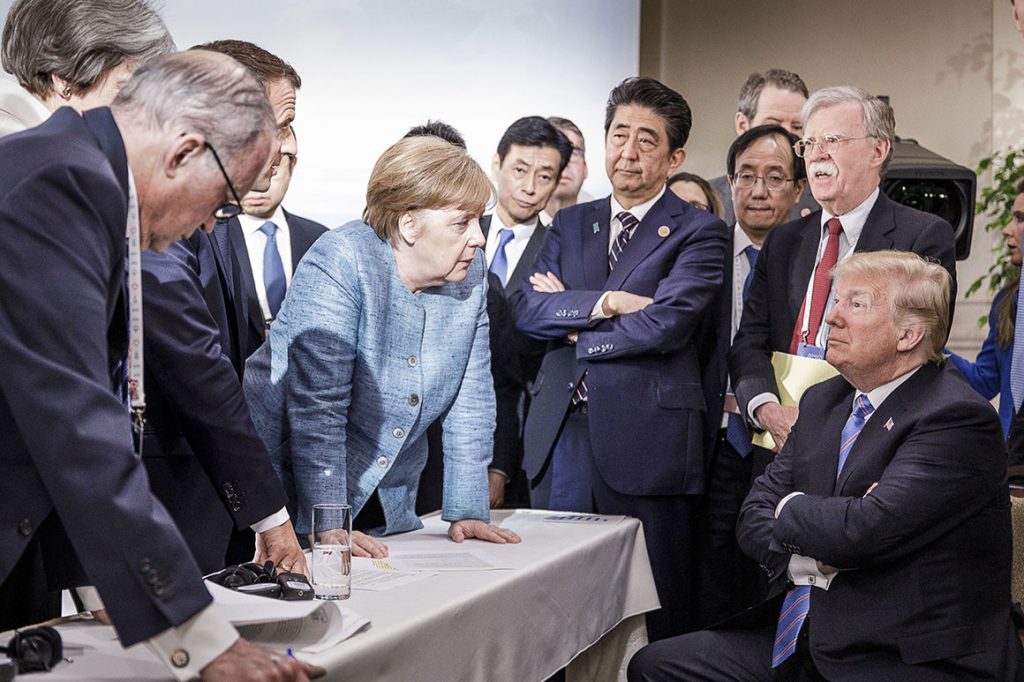During a week when coronavirus deaths in the United States topped 120,000 and the president of the United States admitted he was trying to slow testing for the virus – more testing means more cases, after all – it might be difficult to fully process that we are also living through a unprecedented time of upheaval in American foreign policy.
Whether you love him or hate him, Donald Trump has remade American standing in the world with consequences hard measure, but with impact long lasting. Trump’s upheaval has led to dangerous decline.
“Donald Trump has taken America out of key multilateral agreements, crossed swords with allies and pulled the U.S. from a leading role in geopolitical hot spots,” Bloomberg noted this week in an article about how Russian president Vladimir Putin was celebrating the 75th anniversary of the end of World War II with a big parade in Moscow. Since Trump’s election in 2016, Putin has expanding his influence, while angling to stay in office much longer.

The Trump led retreat from world leadership has, Bloomberg reported, “opened the way for Putin to build influence in Russia’s western flank, the Middle East and Africa, and to tighten an alliance with China. The planes flying in formation … over Moscow are a reminder that others will be eager to fill the gap if the U.S. withdraws further.”
One can deny the existence of Russian election help to Trump in 2016, but it’s impossible to deny the success of Putin’s repositioning at the expense of the United States and out closest, post-World War II European allies.
Putin is certainly the largest beneficiary of Trump’s reported decision to remove nearly a third of U.S. troops based in Germany, a key NATO ally, a decision the BBC reported that was meet with widespread dismay in Europe, in part because there was no consultation or even warning. Many German officials believe the decision was prompted when chancellor Angela Merkel cancelled her visit to the U.S. because of the pandemic. In other words, the decision had less to do with a coherent national policy than the president’s personal pique.
The administration’s Asia policy is in tatters with North and South Korea relations on a hair trigger. Trump tariffs on Chinese imports have cost American consumers (and farmers) billions and left the president begging Chinese president Xi Jinping, according to fired national security advisor John Bolton account, to help him win re-election by buying more U.S. goods.
Bolton’s hefty book, its publication resisted to the very end by Trump, actually matters to our understanding of the feckless, chaotic Trump foreign policy. As conservative columnist Steve Hays argues only the most cultish Trump defender could dismiss a first-hand account “written by a longtime Republican and stalwart conservative—whose mustachioed face has appeared on Fox News more often than just about anyone other than the anchors.”

The power of Bolton’s book rests, Hays says, “less in attention-grabbing disclosure than in the relentless, almost mundane stupidity and recklessness of it all.”
Or as David Ignatius, a long-time observer of American foreign policy, notes: “Among the most startling disclosures in [Bolton’s book] is his account of President Trump’s dealings with Turkish President Recep Tayyip Erdogan. The Turkey story — featuring the American president assuring Erdogan he would ‘take care of things’ in an ongoing federal criminal investigation — may be the clearest, most continuous narrative of misconduct by Trump that has yet surfaced.”
Ignatius says, “It’s a tale that connects some of Trump’s closest advisers: former national security adviser Michael Flynn, personal lawyer Rudolph W. Giuliani, and senior adviser and son-in-law, Jared Kushner.”
Former John McCain advisor Steve Schmidt says of all this that Trump, “has brought this country in three short years to a place of weakness that is simply unimaginable if you were pondering where we are today from the day where Barack Obama left office. And there were a lot of us on that day who were deeply skeptical and very worried about what a Trump presidency would be. But this is a moment of unparalleled national humiliation, of weakness.”
Trump is not alone, of course, in creating our unparalleled national humiliation. He had plenty of help, most notably in the foreign policy field from the junior senator from Idaho James E. Risch, the chairman of the Foreign Relations Committee. Enabling Trump, encouraging his worst instincts and behavior and assisting his destruction of American standing have been the raison d’être of Risch’s otherwise vacuous Senate career.
When Trump’s first secretary of state Rex Tillerson was fired sometime after calling the president “a moron,” Risch said nothing, made no inquiry, expressed no concern. The same pattern unfolded when retired Marine general James Mattis quit in dispute with Trump over Syrian policy. When Bolton was fired Risch let it pass. He’s said nothing about Bolton’s disclosures. Following the Trump playbook, Risch regularly bashes China, but like the president has no policy ideas to deal with the Chinese military and economic threat.
Risch has not pursued the case of brutally murdered Saudi journalist Jamal Khashoggi but has effectively stonewalled efforts to hold the Saudi crown prince to account for the crime. When the State Department’s inspector general was fired recently for reportedly investigating why the administration sidestepped Congress to sell more arms to the corrupt kingdom, Risch said nothing and then helped the secretary of state evade an appearance before this committee.

Risch has gone down the line with Trump is dismissing Russian malevolence, while ignoring the clear effort by the president to coerce the Ukrainian president into a phony investigation of Joe Biden. And when six Republican members of the House Foreign Affairs Committee recently complained to Trump that his draw down of U.S. troops in Germany would “place U.S. national security at risk,” helping only Putin, Risch was silent.
“We live with the idea that the U.S. has an ability to rebound that is almost unlimited,” Michael Duclos, a top European foreign policy official, told The Atlantic’s Tom McTague recently. “For the first time, I’m starting to have some doubts.” For good reason.
As Jim Risch mounts a low-key campaign for re-election, he’s counting that his weakness, his failure to use his position to stem American decline, won’t matter in the deluge of division and misdirection that will increasingly mark all Republican campaigns. Faced with an opponent who so far has been unable – or unwilling – to highlight the senator’s servile deference to Trump’s plundering of America’s standing, Risch will likely continue a 50-yearlong political career distinguished only by its overwhelming partisanship.
History will not be so forgiving.
—–0—–
Additional Reading:
Bolton and the GOP
Michael Cohen writes in the Boston Globe: “I have little doubt that most every member of the GOP caucus, as well as Trump’s Cabinet, knows that Bolton’s account is spot-on, but the price for being a card-carrying member of the modern Republican Party is to regularly refuse to see what is in front of one’s nose. All of this makes the Bolton story more than your garden variety tale of grifters grifting. It’s the perfect parable for Trump’s malevolent presidency and the cabal of corrupted enablers too weak, too greedy, and too feckless to stop it.”
The Painful Reckoning
Many stories this week about the faltering Trump campaign – I know it’s just June – and many, including this piece by Tim Miller, see the campaign’s recent Tulsa rally as a metaphor. Or as Vice President Mike Pence said – they’re going to make America great again, again.

Here’s Miller: “Donald Trump doesn’t know how to manage a global pandemic. He doesn’t understand how said crisis intersects with our economic decline or what to do about it. He is fundamentally incapable of being a uniter or a salve for a country that is raw with pain over police violence and racial tensions. And he doesn’t know what to do about the fact that Joe Biden is schlonging him in the polls.” Read the whole thing.
EU Considers U.S. Travel Ban
As the European Union considers keeping American’s out because of the uncontrolled spread of the virus, novelist Francine Prose asks how did we become a pariah nation?
“Unlike the US states that rushed to reopen too soon, that so clearly prioritized economic recovery over human life, the EU countries are saying they’d rather take the financial hit than see more of their citizens die.”
Gore Vidal
I’ve been reading a collection of essays by the late novelist Gore Vidal who, say what you will about his politics (or whatever), was a truly brilliant writer. Here’s a link to his still controversial post 9-11 essay – “The End of Liberty” – that was commissioned for Vanity Fair, but rejected.

And if you want to recall what Vidal was like on television you might find this amazing appearance on Dick Cavett’s show in 1971 interesting – or appalling. Cavett’s other guests were Norman Mailer and Janet Flanner, the great New Yorker writer.
Mailer refused to shake hands with Vidal and, well, it kind of went downhill from there. Watch it here.
And thanks for reading.
